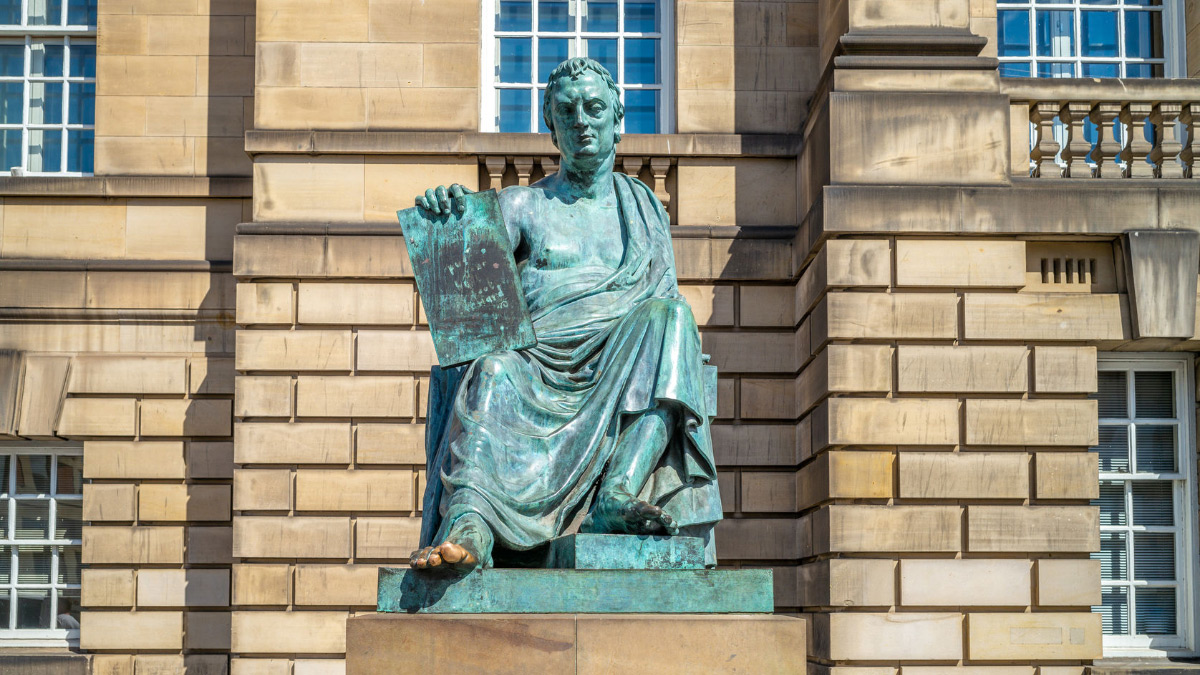Adam Smith is the founder of the classical school of economics, but economic theorizing predates Smith. The philosophic foundations of classical economics are found in the work of the Scottish Enlightenment thinkers of the early to mid-18th century, centered around the University of Edinburgh. Notable among these great thinkers and writers is David Hume.
Hume was born in Edinburgh, Scotland, on May 7, 1711. The extent to which Hume influenced Smith, his close friend, has to be inferred from their respective writings, but the warmth and depth of their relationship is incontestable. Smith said of Hume:
Upon the whole, I have always considered him, both in his lifetime and since his death, as approaching as nearly to the idea of a perfectly wise and virtuous man as perhaps the nature of human frailty will admit. (Goldberg 1961)
Like Smith, Hume tried to use Isaac Newton’s method of analysis in his inquiries. Hume also borrowed from philosopher John Locke’s epistemology as he related mostly moral concerns. Hume saw such moral concerns as the thread that connected his various writings, which included political economy.
While we shouldn’t overemphasize Hume’s economic influence on Smith, their relationship—especially in light of the similarities of some of their analyses—is intriguing. As Roll (1953, 117–18) writes:
In recent years the tendency has even arisen to regard him [Hume] as the most important of the pre-Smithian economists....[T]hey [Hume’s economic essays] are all clearly written and often contain an excellent summary and synthesis of the ideas of his predecessors. In that respect, however, Cantillon’s Essai sur la nature du commerce en général, published in 1755, but written over twenty years previously, is superior.
It is impossible to know whether Smith was more influenced by Cantillon’s book or by personal discussions with Hume. Schumpeter (1954, 124) argues that Hume did influence Smith, and Rothbard (1995, 430) suggests that Hume was one of Smith’s mentors. O’Brien (1975) gives Hume a large role in the development of classical economic thought because of his participation in spreading natural law philosophy.
On the question of self-interest’s role in human affairs, Hume seems to have influenced Smith greatly. For Hume, and for much of the Western world after him, self-interest became the primary motivating force that explained most of social reality (Herman 2001, 170). Hume’s early book expounding his idea of self-interest, A Treatise of Human Nature (1734), may have cost him a university teaching position. The work so horrified other philosophers that some—notably Francis Hutcheson—actively sought to deny him such a position. He later repudiated this first book. However, this was not the last time Hume offended prevailing sensibilities and challenged majority opinion on an issue.
Hume’s view that self-interest could be channeled profitably only through economic cooperation and competition—making civil society a possibility so long as the rule of law prevailed— was a pillar of Smith’s thinking as well. In this regard, Hume’s influence on Smith is both clear and profound. Government is required, they argued, because instinct may cause people to act against their interests, even though they are driven primarily by those selfinterests (Rotwein 1987, 693).
Philosophers see Hume as a direct link between the empiricist political philosophy of Locke, the French laissez-faire Physiocratic movement led by Francois Quesnay and early British political economy. Hume’s economic views overlapped both the mercantilist and classical traditions, depending on the topic he addressed, but were generally pro-free trade and antimercantilist. Because of his extreme skepticism and presumed atheism, as well as his view of human nature, academe was closed to him. He pursued instead a career in public life, traveling for tutoring positions, becoming British chargé d’affaires in Paris and eventually becoming undersecretary of state. He retired from public life in 1769 and returned to Edinburgh.
Hume’s most important foray into economic theory was his discussion of the price-specie-flow mechanism. The movement of specie (gold and silver) between countries balances trade and automatically adjusts international trading partners’ domestic price levels. As such, its intellectual lineage comes directly from the quantity theory of money—traceable back to Locke—as it was applied to international trade balances.
Hume’s economic writings were usually concerned with the idea of economic growth and its causes, perhaps another example of an intellectual focus that he bequeathed to Smith. Hume was sometimes inconsistent in his economic theorizing. In one place he might praise the growth of the money supply, while in another he would correctly show that larger supplies of money lead to rising prices. Smith might also have taken from Hume the deeply flawed labor theory of value, as Hume routinely argued that only labor conveyed value. On balance, Hume favored “hard money”— that is, money made of precious metals that had “intrinsic value.” He also seemed to support ultrasound banking, as when he praised the Bank of Amsterdam for its policy of 100 percent specie-backed deposit reserves (Rothbard 1995, 428).
While arguing that an increase in the money supply is neutral regarding the rate of interest, he also concluded that, in the long run, such a continuing increase might actually lower the interest rate. Although Hume had insights into many important economic issues, his analysis was primarily one of comparative statics, or examinations of equilibrium positions. He seldom discussed in detail the microeconomic adjustment processes that occur between these equilibria, with the exception of his essay Of Money.
Smith’s analysis of economic growth and society owes a great deal to his having read Hume’s massive The History of England. Hume wrote the four-volume work between 1754 and 1762 while librarian at the Advocates’ Library in Edinburgh after failing for the second time to secure a university appointment at Glasgow. Hume contended that commercial society’s birth and growth generated more benefits than costs, a stance he developed while writing his history of Britain. He was not a typical advocate of laissez-faire capitalism, though, even supporting some mild protectionist policies, as did Smith in his Wealth of Nations.
For Hume, and then Smith, commercial society was a form of social contract, a method of controlling human passions in a way that increased output that all might share, regardless of the effect on individuals. Smith based his own “system of natural liberty” on this idea, which Hume so skillfully demonstrated in his writings. Unsurprisingly, both men were opposed to gross restrictions on international trade, and Hume in particular worked out his specie-flow mechanism in part to discredit protectionist, mercantile doctrine. After he and Smith had finished with it, mercantile theory was intellectually dead, although its protectionist tendencies have always been a part of international trade policy and remain so for many nations even today.
It is perhaps fitting that Hume died in 1776, the year Smith published his famous work of political economy, Wealth of Nations, most of which Hume told Smith he agreed with. Coming at the beginning of the classical period, Hume’s own economic writings—as well as his impact on Smith—make him still worthy of careful study by anyone interested in the history of ideas generally and in the evolution of economic theory specifically.








